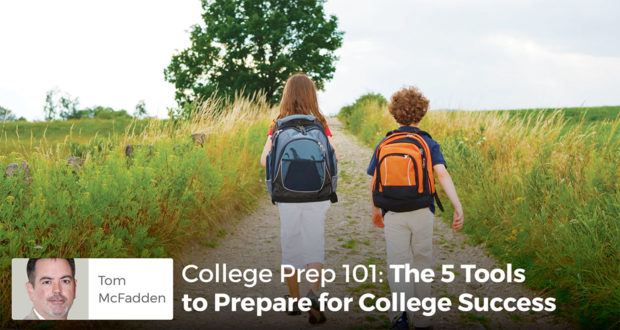Summary
Tom McFadden, an expert on college prep, has five critical elements for parents to consider as they prepare their children for the task of going to college.Working in Christendom College’s admissions office for the past 16 years, I’ve spent a lot of time speaking with homeschooling parents, answering their questions, trying to alleviate their fears, and giving them insights into how they might best prepare their children for the daunting task of going to college.
I’ve written before about some insights I have on the process of selecting a good Catholic college, but here I want to focus on some particular aspects that will benefit a homeschooler as he plans to go to college for the first time.
1. Money, Money, Money
In my experience, one of the biggest obstacles to attending college for most families is money. Or more accurately, the lack of money.
Many homeschooling families, regardless of which educational program they use or how much money the family makes, are not used to spending a lot of money on educating their children.
Families who attend Private School Academy are at least in the financial habit of spending lots of money on tuition each year, and so, for them, when it comes time to start planning for college, the concept of investing large sums of money into Johnny’s college education is not very difficult to imagine.
But for many homeschoolers, since (thankfully) most homeschooling programs are very reasonably priced, it can be a problem, so thinking of ways to be able to tackle this obstacle is of the utmost importance.
It is important to contact admissions offices at your favorite colleges and universities to find out how much it costs to go there (the sticker price), how much people generally actually pay to go there (the average net price – which is usually quite a bit lower than the sticker price), what kinds of scholarships are available and what the criteria is for gaining them, what the on-campus job situation is like, whether you can use outside loans or scholarships, and other such important aspects.
And this should be figured out early on in the high school years, not during senior year!
Once you know the answers to these things, you can then plan, and save, accordingly.
2. Check Your Aptitude – Early and Often
At many colleges, academic scholarships are given out based on a student’s standardized test scores, coupled with his high school GPA.
This is important to know because the test scores you get on the SAT, ACT, or CLT (not familiar with the CLT? It’s a new standardized test now being accepted at select schools) can sometimes determine the amount of free scholarship money you receive. Higher scores = more money.
I personally have my children take the SAT three times – once when they are sophomores, once when they are juniors, and once when they are seniors. So far, for my eldest three children, they initially scored pretty well, but after the third time, they ended up getting much higher scores which made them eligible for more scholarship money at every college to which they applied.
So, the point of all of this is, don’t consider the SAT/ACT/CLT as some sort of one-time-only event, because most people’s scores do go up after taking the tests multiple times, and this can help you save money in the long run.
Spending the $55 or so on these tests, and taking the extra time to study, study, study, practice test, practice test, practice test can “earn” you $60K-100K in FREE scholarship money over four years at many schools.
Now that’s something worth studying for!
3. Take Notes on Taking Notes
Many homeschooled students have not had the experience of taking notes while a teacher is teaching a class.
That’s just the way it is, due to the nature of homeschooling in general. And that’s OK. But, most colleges, or at least the ones where you can expect a rigorous academic program, will have professors teaching classes and students will be expected to take notes.
So, figuring out a way to do this can be very important.
A couple of ways to improve your note taking skills might be to enroll in a community college class, to get the classroom experience as a high schooled student, and take notes in class.
Another way would be to listen to an audio book, and try and take down what the reader is saying, and then going over what he said and try to condense it into a shorter paragraph.
My eldest son, John, taught himself shorthand before attending Christendom, and that enabled him to get every word that the professors said in class – which made his notes invaluable, both to him and to his siblings who are taking those same classes now.
4. Schedule Your Life
I think one of the biggest adjustments for a homeschooler going to college is the amount of “free time” that college students have, compared to the amount of “free time” high schooled students have. What’s the big difference, you say?
When students are in high school, they spend hours upon hours in class, so to speak, learning their lessons.
When I was in high school in Ireland, school started at 9am and ended at 4pm, with an hour lunch break – 6 long and grueling hours each day. Then I spent 3-4 hours each night doing homework.
My high school aged children who are enrolled in Seton Home Study School seem to spend about that same amount of time each day doing school work, too.
When you go to college, if you end up taking 15-18 credits per semester (that’s 4-6 classes), that means that you will be spending about 15-18 hours per week in class. If we spread that over a 5-day week, that’s 3-4 hours a day in class – a whole lot less than you would in high school.
So that means there are many more “free” hours each day, and how you use them will determine how you do in college, and maybe even in life. No pressure.
At rigorous colleges, the expectation is that a student will spend many hours per day going over the readings and notes they took for each class, pre-reading for the next day’s classes, working on research term papers, and studying for quizzes, tests, and major exams.
So, although on the surface, it appears that there are less hours devoted to school work, there are actually more hours devoted to it – it’s just arranged differently.
Learning how to juggle the academic life with the social life, being away from home for the first time, doing laundry (maybe for the first time), making new friends, attending to your spiritual life, playing sports and doing recreational activities, and all of the other things that are part of the college life – all of this needs to be scheduled.
But don’t wait until college to begin living by a detailed schedule.
Start one in high school and stick to it. You will not regret it when you find yourself calm, cool, and collected during freshman mid-term time, while others are scrambling around trying to just keep their heads above water.
5. Comprehending Comprehension
If you think that you might end up studying the Catholic liberal arts at a college that is known for its academic rigor and extensive reading lists, like, say, Christendom College, then it is imperative that you learn how to read.
No, not Hop on Pop, or Little House in the Big Woods, as lovely as they are, but reading the classics, and understanding what you are reading.
You will be asked to do an extensive amount of reading for each class, in general, and you will need to be able to read the material, think about the material, comprehend the material, and then be able to explain that material to someone else – all in a very short period of time.
If you do not particularly like reading, or you are having trouble figuring out the plot of a Hardy Boys book, you will definitely need to pick up the pace and start reading more frequently and reading books with deeper meaning.
While in high school, create a book reading list that might include some of the books used by your favorite colleges during freshman year.
Read them a couple of times before going to college so that when you get there, you will have a better comprehension of what the books were all about. That will help you, ultimately, to participate better in class discussion, to write papers on the subject matter, and receive a better overall education – the purpose of going to college in the first place!
If you think about some of these things during freshman and sophomore years of high school, you will find that you will be much better prepared when making your college plans.

 Seton Magazine Catholic Homeschool Articles, Advice & Resources
Seton Magazine Catholic Homeschool Articles, Advice & Resources

